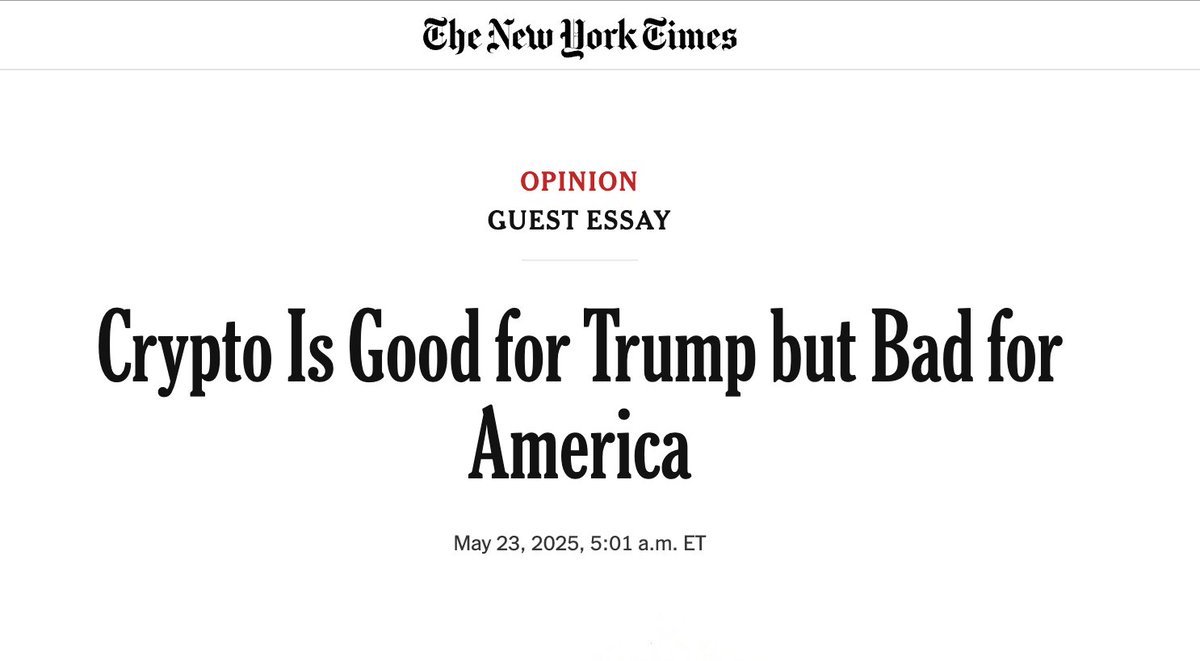.@intangiblecoins has already discussed this NYT op-ed well, but my 2c. the author makes elementary mistakes about the dollar system and stablecoins.
> [crypto] carries enormous risk for financial stability across the world. For starters, we can look at the words of crypto enthusiasts who used to dream that a private digital system could displace the dollar.
stablecoins represent a more moderate faction than the bitcoiners who think bitcoin will take over. most on-chain settlement on blockchains happens on stablecoins, not BTC/ETH others. objectively, stablecoins are dollarizing blockchains, by taking over UoA and MoE.
> American financial hegemony would give way to a private-sector free-for-all.
money is already a private sector enterprise. monetary base (i.e. "government" money) is $5.6T, bank-created money (M1) is $19T. private sector money is 75%, public is 25%. if you include offshore money, M0 is only 10-15%.
> Democratic staff members on the Senate Banking Committee say that the Genius legislation would allow U.S. exchanges to trade stablecoins from offshore companies outside the full scope of U.S. regulation.
This is literally already the case under the pre-GENIUS status quo. GENIUS restricts how domestic firms are able to operate wrt offshore stablecoins, and disempower offshore stables to the benefit of onshore ones.
> Yet if confidence in their stablecoins fell and they were suddenly required to redeem 20 percent of their holdings, these smaller [european] banks would face the equivalent of a deposit run.
The European fragility with regards to stablecoins is self-imposed. MiCA requires stablecoins hold large portions of their reserves in uninsured cash deposits in banks, which is obviously a bad idea. Would not be a feature of the US system
> Specifically, if a stablecoin got into trouble or turned out to be a fraud, would it be bailed out? Doing so could create massive liabilities for U.S. taxpayers.
The GENIUS act tightens up regulation of stablecoin issuers, to ensure 1:1 backing with high quality liquid assets, depositor priority in liquidation, and improved transparency. The odds of a bank run (and resultant bailout) are similar to a run on a money market fund – virtual nil. If a stablecoin is a fraud, it will be very easy to spot, under the new rules. Something like Terra's UST would be impossible to run in this system.
> Furthermore, the emerging dollar-crypto nexus might enable criminal finance at an unprecedented scale.
Stablecoin issuers have become very adept at freezing and seizing illicit flows or seizing hacked funds and so on. They are vastly better for dealing with criminal finance than cash transactions or even transfers through networks of banks.
> Philip Lane, the chief economist at the European Central Bank, argues that reliance on stablecoins would shift financial activity from euros to private-sector cryptocurrencies based on the dollar.
Europe's problem. Maybe they should have written regulation allowing Euro stablecoin issuers to compete rather than crushing the sector.
> [A digital Euro] would provide built-in privacy and security and, unlike stablecoins, would be controlled by the public sector.
So stablecoins are "too private" in the previous paragraph and "not private enough" in this one. And there's no reason a public sector payments system is inherently better than a private sector one. Payment systems globally are a blend of public and private.
> Stablecoins are not cementing dollar dominance by allowing the United States to catch up with the rest of the world.
Stablecoins are empirically extending the reach of the dollar, 99% of stables are dollar-based, and they are giving individuals worldwide access to the dollar (and highly efficient payment rails) where they never had it before. This is not debatable, it's just the reality today.

519
72.83K
The content on this page is provided by third parties. Unless otherwise stated, OKX TR is not the author of the cited article(s) and does not claim any copyright in the materials. The content is provided for informational purposes only and does not represent the views of OKX TR. It is not intended to be an endorsement of any kind and should not be considered investment advice or a solicitation to buy or sell digital assets. To the extent generative AI is utilized to provide summaries or other information, such AI generated content may be inaccurate or inconsistent. Please read the linked article for more details and information. OKX TR is not responsible for content hosted on third party sites. Digital asset holdings, including stablecoins and NFTs, involve a high degree of risk and can fluctuate greatly. You should carefully consider whether trading or holding digital assets is suitable for you in light of your financial condition.

